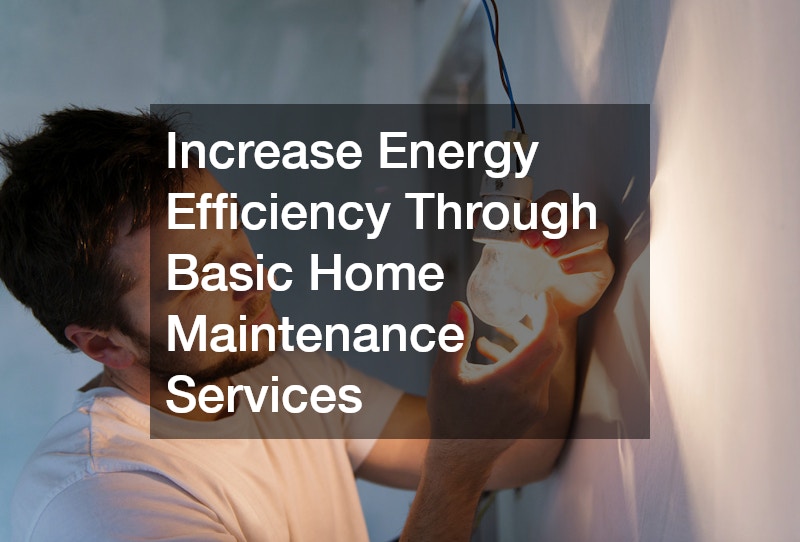Explore how basic home maintenance services can enhance energy efficiency, reduce energy bills, and create a more sustainable living environment. With small improvements and regular upkeep, homeowners can make a substantial impact on their energy consumption and comfort.
What is Energy Efficiency and Why is it Important?
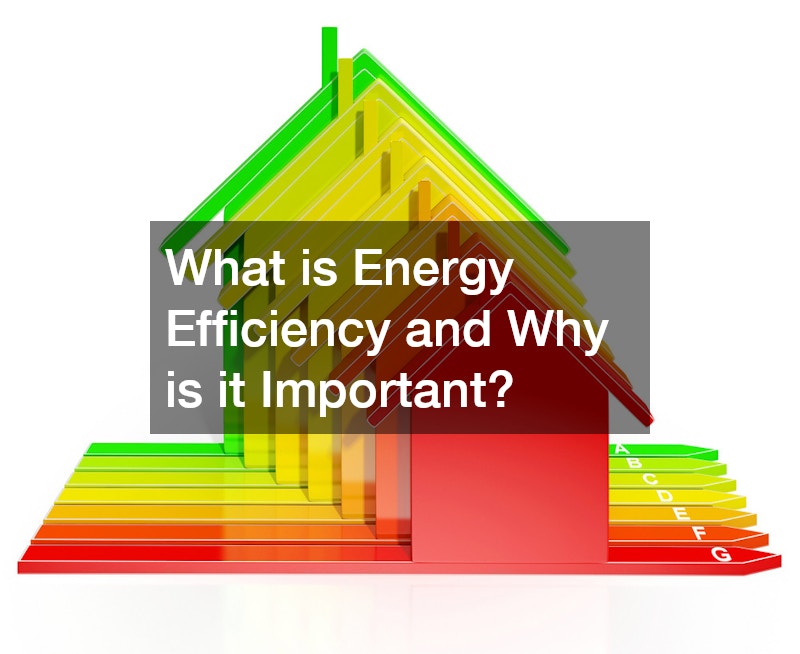
Understanding Energy Efficiency
Energy efficiency means using less energy to perform the same tasks, such as heating, cooling, or lighting your home. By optimizing energy use, homeowners reduce waste and ensure that every unit of energy contributes effectively to comfort and function. An energy-efficient home requires less power for the same outcome, which reduces both bills and environmental impact.
Benefits of Energy Efficiency in Homes
Energy-efficient homes provide consistent indoor temperatures, lower utility costs, and improved comfort. Optimized energy systems also reduce wear and tear on major appliances, including furnaces, air conditioning units, and water heaters. Even small improvements, such as adding insulation or sealing leaks, can have measurable results.
The Impact of Energy Efficient Homes on the Environment
Homes that use less energy contribute to lower greenhouse gas emissions, reduced fossil fuel use, and a smaller carbon footprint. Energy efficiency supports environmental sustainability by conserving natural resources and minimizing the ecological impact of everyday household energy use.
How Energy Efficiency Reduces Energy Bills
Minimizing energy use directly lowers electricity and propane bills. Efficient heating and cooling, well-maintained HVAC systems, proper insulation, and energy-conscious lighting all help reduce overall consumption. Over time, these savings can offset the cost of improvements and maintenance services.
Busting Myths about Energy Efficiency
Many homeowners assume that energy efficiency requires costly renovations. In reality, basic home maintenance, like furnace installation checks, crawlspace sealing, or routine HVAC contractor visits, can significantly improve energy efficiency without a large upfront investment.
How Can Insulation Improve Energy Efficiency?
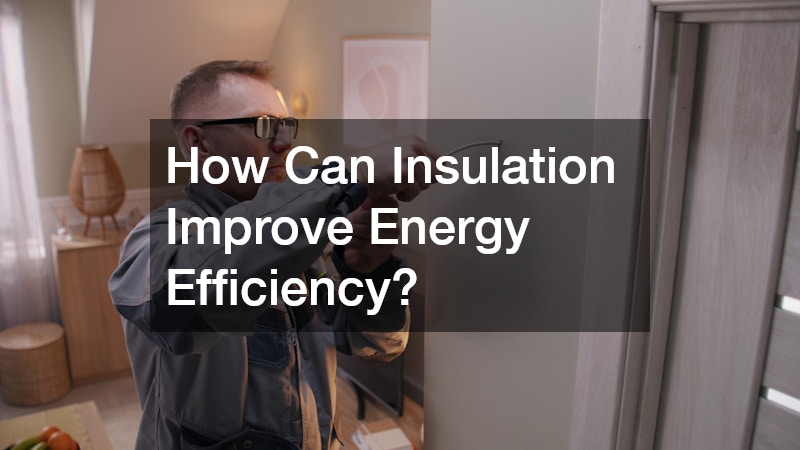
Types of Insulation for Homes
Insulation plays a critical role in maintaining indoor comfort. Common types include fiberglass, spray foam, cellulose, and rigid foam boards. Each type has its advantages, whether it’s high R-value, ease of installation, or suitability for attics, walls, and crawlspaces. Proper insulation ensures that heated or cooled air stays inside, reducing the need for constant furnace or AC operation.
Assessing Insulation Needs
Homeowners should assess their insulation by checking for drafts, uneven temperatures, or high energy bills. Professional energy audits can reveal poorly insulated areas in walls, attics, and crawlspaces. Addressing these issues ensures the home maintains efficiency year-round.
Installation of Insulation
Correct installation is essential. Even the best insulation will fail if there are gaps or compressed areas. Installing insulation in attics, walls, or around ducts helps furnaces and air conditioners operate efficiently. Insulation also protects plumbing and water wells from temperature extremes, which can reduce maintenance needs over time.
Common Insulation Issues and How to Fix Them
Insulation can settle, degrade, or be damaged by moisture and pests. Gaps or compression reduce efficiency and may force HVAC systems to work harder. Routine inspections and repairs, along with pest control when needed, maintain optimal performance.
Insulation Maintenance Tips
Inspect insulation periodically, especially in attics and crawlspaces. Keep insulation dry, free from pests, and properly distributed. This simple step ensures continuous energy savings and reduces strain on heating and cooling systems.
How Does Regular HVAC Maintenance Affect Energy Efficiency?
Importance of Regular HVAC Check-Ups
HVAC systems consume the most energy in homes. Regular check-ups by an experienced HVAC contractor help maintain peak efficiency. Inspecting furnaces, AC units, and ductwork prevents wasted energy and helps avoid costly repairs. Well-maintained systems also support consistent indoor comfort, even in extreme weather.
DIY Maintenance Tips for HVAC Systems
Homeowners can perform basic maintenance, such as changing filters, clearing debris around outdoor units, and monitoring thermostat settings. Seasonal inspections of HVAC systems prevent energy loss and extend the life of the system. Regular AC repair checks and furnace installation reviews also ensure the equipment operates safely and efficiently.
Signs Your HVAC System Needs Professional Attention
Unusual noises, uneven heating or cooling, rising energy bills, or frequent cycling indicate HVAC issues. Prompt intervention by a licensed HVAC contractor can prevent more significant problems while maintaining energy efficiency.
Upgrading Your HVAC System for Better Efficiency
Older systems may lack modern efficiency features. Upgrading to a high-efficiency furnace, air conditioner, or propane-powered heating system can lower energy consumption. Pairing upgrades with insulation improvements and duct sealing amplifies savings.
Seasonal HVAC Maintenance Checklist
Regular maintenance includes cleaning or replacing filters, inspecting ductwork, testing thermostat functionality, and checking refrigerant levels. Seasonal attention ensures optimal performance for both heating and cooling needs throughout the year.
What Are the Benefits of Energy Efficient Lighting?
Types of Energy Efficient Bulbs
LED and compact fluorescent bulbs consume far less energy than traditional incandescent bulbs. They provide comparable or better lighting while reducing electricity use.
Installing Energy Efficient Lighting
Replacing older bulbs with energy-efficient options is simple and impactful. Proper placement, such as task lighting or motion-sensor fixtures, maximizes efficiency and comfort.
Lighting Design for Energy Efficiency
Using natural light strategically, combining dimmers with LED lighting, and arranging fixtures to avoid over-illumination all contribute to energy savings. These design choices reduce the need for supplemental heating or cooling by minimizing heat generated from lighting.
Reducing Light Pollution with Energy Efficient Lighting
Energy-efficient lighting can also minimize light pollution. Directional and shielded fixtures reduce wasted light while lowering electricity consumption, creating both a more efficient and environmentally friendly home.
Cost Analysis: LED vs Traditional Bulbs
Though LED bulbs cost more upfront, they last longer and consume less power. Homeowners can calculate long-term savings, factoring in reduced energy bills and fewer replacements, making LEDs a practical choice for sustainable living.
How Can Weatherproofing Enhance Energy Efficiency?
Identifying Air Leaks in Your Home
Air leaks around windows, doors, and crawlspaces contribute to energy waste. Conducting simple tests, like checking for drafts with a candle or using thermal imaging, helps locate problem areas.
Weatherproofing Solutions for Doors and Windows
Sealing gaps with caulk, weatherstripping, or upgrading to energy-efficient doors and windows minimizes heat transfer. Home window tinting services can further reduce heat gain in summer, decreasing reliance on air conditioning and lowering energy bills.
Using Draft Stoppers and Weather Stripping
Draft stoppers for doors and proper weather stripping around windows reduce air infiltration. These inexpensive solutions significantly improve energy efficiency and comfort.
Sealing Ducts for Better Energy Efficiency
Leaks in ductwork allow conditioned air to escape, forcing HVAC systems to work harder. Proper duct sealing ensures efficient airflow and reduces energy costs.
Long-term Benefits of Weatherproofing
Weatherproofing not only lowers energy bills but also protects the home’s structure. Reducing moisture intrusion, preventing pest entry, and improving indoor air quality are additional long-term benefits.
What are the Best Energy-Efficient Appliances for Your Home?
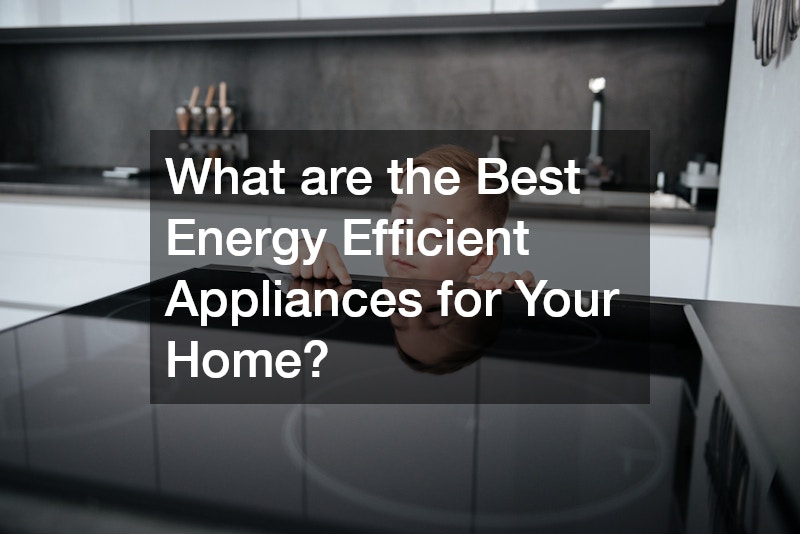
Understanding Energy Star Ratings
Energy Star-rated appliances meet strict efficiency criteria. Choosing appliances with these ratings, from refrigerators to washers, ensures lower energy consumption and reduced utility bills.
Top Energy Efficient Appliances on the Market
High-efficiency water heaters, propane-powered stoves, and energy-conscious washers and dryers provide reliable performance while minimizing energy use. Selecting the right appliances based on household needs maximizes long-term savings.
Cost vs. Savings: Are Energy Efficient Appliances Worth It?
While energy-efficient appliances may cost more upfront, the savings over time are significant. Reduced electricity or propane usage, lower repair costs, and longer lifespans make them a worthwhile investment.
Integrating Smart Appliances for Energy Management
Smart appliances allow homeowners to monitor and adjust energy use remotely. Automated scheduling, temperature management, and energy tracking help reduce unnecessary consumption.
Maintenance Tips for Energy Efficient Appliances
Routine care, such as cleaning refrigerator coils, inspecting water heaters, and maintaining washers and dryers, ensures appliances perform at peak efficiency. Regular attention prevents costly breakdowns and energy waste.
How Can Smart Home Technologies Contribute to Energy Efficiency?
Overview of Smart Home Technologies
Smart home technologies optimize energy use and provide convenience. Devices include smart thermostats, automated lighting, energy-monitoring plugs, and integrated home control systems.
Smart Thermostats and Energy Management
Smart thermostats learn household patterns and adjust heating or cooling automatically. This reduces wasted energy and ensures comfortable temperatures without constant manual adjustments.
Automating Home Lighting for Efficiency
Smart lighting systems allow homeowners to schedule lights, dim when not needed, or control them remotely. Automated lighting reduces electricity usage and integrates well with energy-efficient bulbs.
Integrating Smart Power Strips
Smart power strips prevent energy waste by cutting power to electronics that are not in use. These devices are especially useful in homes with multiple appliances and entertainment systems.
Monitoring Energy Consumption with Smart Devices
Smart plugs, apps, and energy dashboards help homeowners track usage patterns. Identifying high-energy appliances allows for targeted improvements, such as replacing older units or adjusting usage schedules.
How to Increase Energy Efficiency of Water Heaters?
Choosing Between Tank and Tankless Water Heaters
Tankless water heaters provide hot water on demand, reducing standby energy loss. Conventional tanks can be more cost-effective upfront but may waste energy heating water continuously.
Insulating Your Water Heater
Adding insulation blankets to water heaters improves efficiency by retaining heat. Insulating pipes reduces energy lost during water transport, especially in crawlspaces or basements.
Adjusting Water Heater Temperature for Savings
Maintaining a safe yet efficient temperature, around 120°F, can reduce energy use and lower propane or electricity bills.
Regular Maintenance Tips for Water Heaters
Routine flushing, checking for corrosion, and inspecting the anode rod extend water heater life. Plumbers often provide maintenance services to ensure safe and efficient operation.
Exploring Solar Water Heating Options
Solar water heaters use renewable energy to provide hot water, reducing reliance on electricity or propane. While initial investment is higher, long-term savings and environmental benefits are significant.
Are Solar Panels a Worthwhile Investment for Energy Efficiency?
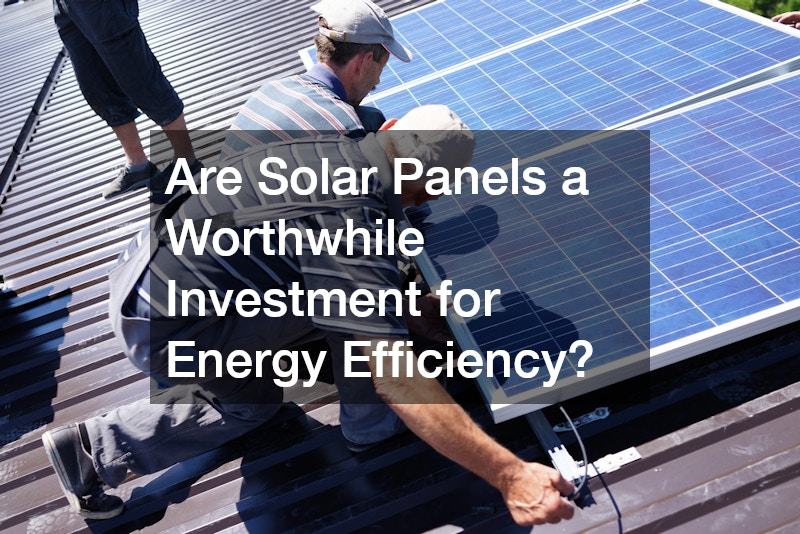
Benefits of Installing Solar Panels
Solar panels generate clean, renewable energy, reducing electricity bills and carbon footprint. Coupled with efficient home systems, solar energy can significantly lower overall energy consumption.
Installation Process of Solar Panels
Professional installation ensures proper alignment, wiring, and safety. Some landscaping company services may coordinate placement and integrate solar panels with existing outdoor designs.
Financial Incentives for Solar Panel Installation
Tax credits, rebates, and net metering programs make solar installation more affordable. Calculating long-term savings against upfront costs helps determine feasibility.
Maintenance of Solar Panels
Solar panels require minimal maintenance, usually cleaning and occasional inspection. Ensuring panels remain unobstructed by trees or debris maximizes efficiency.
Challenges and Considerations with Solar Energy
Solar panel efficiency can be affected by weather, roof orientation, and shading. Homeowners should consider these factors alongside existing energy systems to ensure optimal performance.
How Do Behavioral Changes Impact Home Energy Efficiency?
Mindful Usage of Household Electronics
Turning off lights, unplugging devices, and limiting unnecessary appliance use reduces energy consumption. Integrating smart power strips and timers can reinforce these habits.
Benefits of Unplugging Unused Devices
Even standby power can add up over time. Unplugging electronics when not in use prevents phantom energy loss and contributes to overall efficiency.
Adapting Seasonal Energy-Saving Habits
Adjusting thermostat settings seasonally, using ceiling fans in summer, and layering clothing in winter reduces strain on HVAC systems and propane heating.
Encouraging Household Members to Adopt Energy-Efficient Practices
Family involvement ensures consistent energy-saving habits. Teaching children and adults about turning off devices, closing doors, and using energy-efficient appliances fosters a sustainable lifestyle.
Tracking and Reducing Energy Consumption
Monitoring energy use through smart devices, bills, or apps identifies trends and areas for improvement. Setting goals for energy reduction motivates ongoing efficiency improvements.
Closing Thoughts
Energy efficiency is more than a trend—it represents a meaningful shift toward sustainable living and responsible homeownership. By implementing basic home maintenance services, such as furnace installation checks, AC repair, crawlspace insulation, water well maintenance, and calling in experienced HVAC contractors or plumbers when necessary, homeowners can significantly reduce energy consumption and prevent costly system failures. Incorporating additional measures, like propane-efficient heating solutions, home window tinting services to reduce cooling loads, and well-planned landscaping company projects that provide shade and wind protection, further amplifies energy savings. Integrating smart home technologies, selecting energy-efficient appliances, and adopting simple behavioral changes, such as unplugging unused devices and adjusting thermostat settings seasonally, ensures that homes remain comfortable, cost-effective, and environmentally responsible for the long term. With consistent attention to maintenance and energy-conscious choices, every homeowner can create a more sustainable and resilient home.
